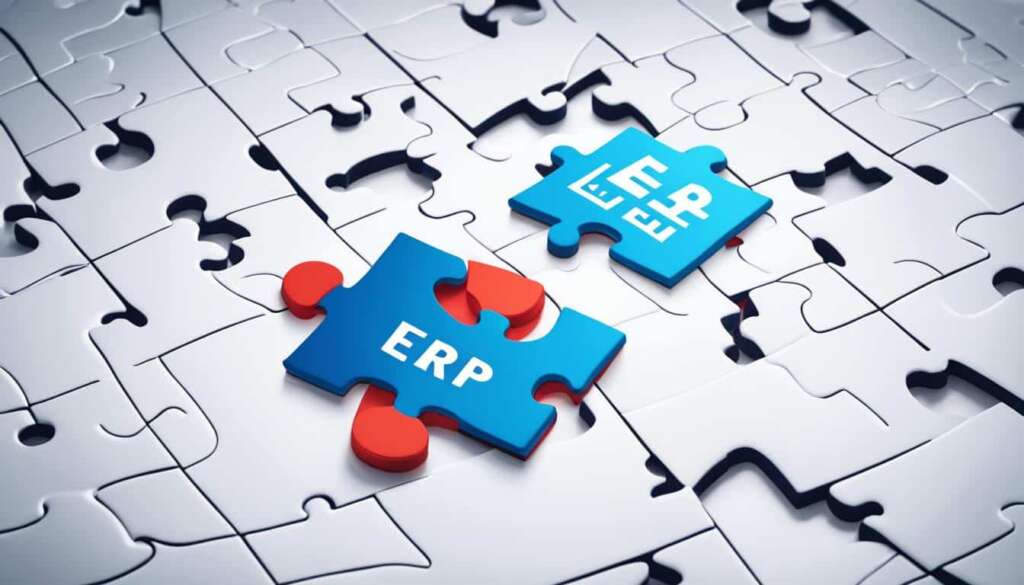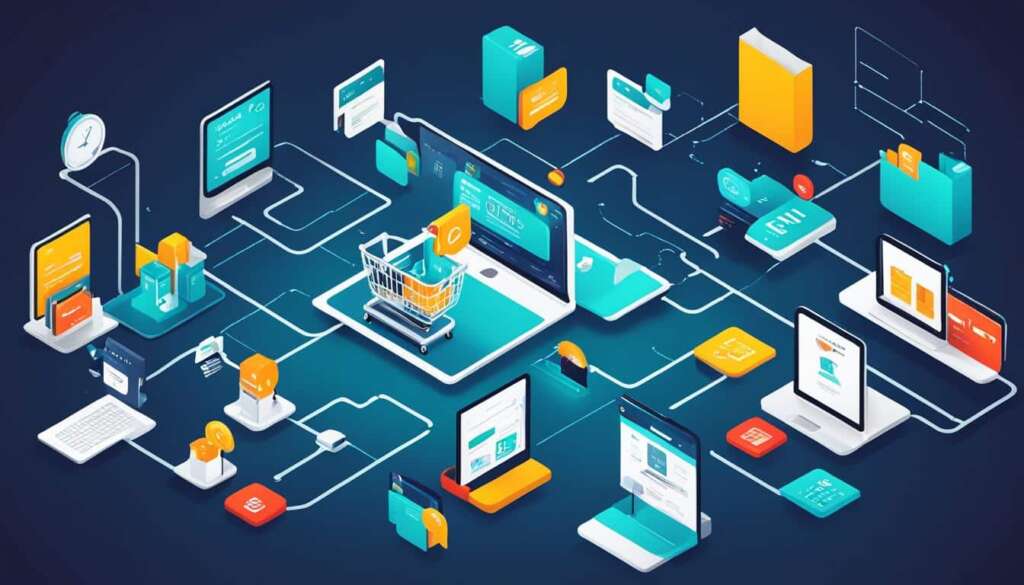Table of Contents
E-commerce ERP solutions are essential for online businesses to streamline their operations and achieve seamless business operations. These solutions help in managing inventory, automating processes, and improving workflows.
With the increasing growth of the e-commerce market, the demand for tailored e-commerce ERP solutions is also on the rise. It is important for businesses to implement these solutions to optimize their stores and enhance their efficiency.
Streamlining online sales and inventory management are key aspects of successful e-commerce operations. By integrating an e-commerce ERP system, businesses can efficiently manage their inventory, automate processes, and improve overall productivity.
Implementing the right e-commerce ERP solution can help businesses achieve seamless inventory management, streamlined workflows, and enhanced customer experiences. By leveraging these tailored e-commerce ERP solutions, businesses can optimize their stores and strengthen their online presence.
How E-Commerce ERPs Elevate Existing Online Stores
E-commerce ERPs play a crucial role in elevating existing online stores by streamlining workflows and creating better processes. With their ability to automate various tasks such as order processing and inventory management, ERPs significantly improve efficiency and enhance the overall customer experience. When integrated seamlessly, an ERP can optimize the entire e-commerce solution, resulting in enhanced performance and steady growth.
Streamlining workflows: Integrated ERP systems streamline workflows by automating repetitive tasks, reducing manual effort, and minimizing errors. This allows businesses to allocate resources effectively and focus on core activities that drive growth.
Better processes: By implementing an ERP, businesses can establish standardized and efficient processes across departments. This ensures consistency in operations and eliminates bottlenecks, resulting in improved productivity and customer satisfaction.
Automating processes: E-commerce ERPs are designed to automate time-consuming processes such as order fulfillment, inventory management, and shipping. This not only saves valuable time but also reduces the chances of errors and delays, enabling businesses to provide a seamless and efficient online shopping experience.
“An integrated ERP solution can revolutionize the way online stores operate, creating a strong foundation for growth and success.” – Jane Adams, E-commerce Consultant
Optimize e-commerce solution: An integrated ERP optimizes the entire e-commerce solution, from top to bottom. It provides comprehensive insights into various aspects such as sales, inventory, and customer data, allowing businesses to make data-driven decisions and enhance their overall performance. With the ability to seamlessly integrate with other systems and platforms, ERPs provide a centralized view of the entire e-commerce ecosystem.
To illustrate the effectiveness of E-commerce ERPs, consider the example of an online store that experiences a high volume of orders daily. Without an ERP, manually processing these orders can be time-consuming and prone to errors. However, with an integrated ERP, the order processing can be automated, ensuring quick and accurate fulfillment. This not only improves operational efficiency but also enhances the customer experience by reducing order processing and delivery times.
The key takeaway is that E-commerce ERPs provide businesses with the tools necessary to streamline workflows, automate processes, and optimize their e-commerce solutions. By implementing a tailored ERP system, online stores can achieve better efficiency and enhance their overall performance, ultimately leading to sustainable growth and success.
Types of ERPs to Consider
When considering ERP solutions for e-commerce, businesses have three types to choose from – generalist ERP, modular ERP, and ERP suites. Understanding the different types of ERPs and their integration types is crucial for making an informed decision.
Generalist ERP: Generalist ERPs are suitable for typical business needs and offer a range of functionalities. These ERPs provide comprehensive solutions that cater to different aspects of e-commerce operations, such as finance, inventory management, and customer relationship management.
Modular ERP: Modular ERPs allow businesses to select specific components as per their requirements. Instead of implementing a full-scale ERP system, businesses can choose individual modules that address their specific needs. This modular approach offers flexibility and customization options for e-commerce businesses.
ERP Suites: ERP suites combine various e-commerce systems and add-ons into one comprehensive application. They integrate multiple modules and functionalities into a cohesive platform, providing a centralized solution for managing different aspects of e-commerce operations. ERP suites offer a holistic approach to e-commerce management, with features such as order processing, inventory management, and customer support all in one system.
Choosing the right type of ERP depends on several factors, including the specific needs of the business and the level of integration required. The table below provides a visual comparison of the different ERP types:
| Feature | Generalist ERP | Modular ERP | ERP Suites |
|---|---|---|---|
| Range of functionalities | Wide range | Specific modules | Comprehensive suite |
| Customization | Limited | Highly customizable | Customizable |
| Integration | Individual modules | Can be integrated with existing systems | Fully integrated |
| Scalability | May require additional modules | Can add modules as needed | Scalable by design |

By considering the strengths and weaknesses of each ERP type, businesses can make an informed decision about which solution aligns best with their e-commerce goals and requirements.
Impactful Ways to Implement ERPs
Implementing an ERP requires careful consideration of the business needs and infrastructure. To ensure a successful implementation, businesses have three main options to choose from: on-premise ERPs, cloud-based ERPs, and hybrid ERP models. Each implementation model offers unique benefits and considerations, tailored to specific business requirements.
On-Premise ERPs
On-premise ERPs are installed and hosted on the business’s own servers. This implementation model is ideal for industries with strict data storage and protection regulations. By keeping the ERP system on-site, businesses have more control over their data and can ensure compliance with industry-specific security standards. On-premise ERPs also offer the flexibility for customization, allowing businesses to tailor the software to their specific needs.
Cloud-Based ERPs
Cloud-based ERPs, also known as Software as a Service (SaaS) solutions, are hosted on third-party servers and accessed via the internet. These ERPs offer ease of use and scalability, as businesses can subscribe to the required services and access them from any device with an internet connection. Cloud-based ERPs eliminate the need for businesses to manage servers and perform regular maintenance tasks, as these responsibilities are handled by the ERP provider. Furthermore, cloud-based ERPs often provide regular updates and enhancements, ensuring businesses have access to the latest features and functionalities.
Hybrid ERP Models
Hybrid ERP models combine the best of both on-premise and cloud-based solutions. With a hybrid model, businesses can leverage the advantages of both implementation options. For instance, sensitive data can be stored on-premise, while other processes can be managed in the cloud. This approach allows businesses to maintain control over critical data while taking advantage of the scalability and flexibility offered by cloud-based ERPs. Hybrid ERP models are particularly suitable for businesses with legacy systems that require integration with newer cloud-based applications.
Choosing the right ERP implementation model depends on various factors, including security requirements, customization needs, and existing infrastructure. It is essential to assess the unique needs and goals of the business to make an informed decision. Whether it’s an on-premise ERP, a cloud-based solution, or a hybrid model, implementing an ERP can transform business processes and improve overall efficiency.
[Image Description: An image representing hybrid ERP models, showcasing the combination of on-premise and cloud-based solutions.]
Best Time for Businesses to Implement ERPs
Implementing an ERP system into a business is a significant decision that requires careful consideration. While there is no perfect time to undertake this endeavor, certain factors should be taken into account to ensure a successful implementation. These factors include clear communication, messy manual work, ERP management, and stakeholder engagement.
Clear Communication
Clear communication is crucial throughout the process of implementing an ERP system. It is important to ensure that all stakeholders, including employees, management, and external partners, are aware of the changes that will occur as a result of the ERP system. Communicating the benefits that the system will bring to the organization is equally important, as it helps to build support and understanding among stakeholders.
Messy Manual Work
During the integration process, it is common to encounter some messy manual work. This may involve transferring data, mapping workflows, and addressing compatibility issues between existing systems and the new ERP system. Anticipating this messy manual work and having a plan in place to tackle it can help minimize disruption and ensure a smoother transition.
ERP Management
Proper ERP management is essential to ensure that the system operates effectively and efficiently. This includes setting up appropriate access controls, maintaining data integrity, and regularly monitoring and maintaining the system. Effective ERP management ensures that all modules are functioning as intended and that any issues are promptly addressed to avoid disruptions to business operations.
Stakeholder Engagement
Engaging with stakeholders throughout the ERP implementation process is crucial for its success. Proactively involving key stakeholders, such as department heads, IT teams, and end-users, allows for their input and helps address their concerns. Engaging stakeholders also helps in building a sense of ownership and commitment towards the ERP system, increasing the likelihood of successful adoption and utilization.
To summarize, implementing an ERP system requires clear communication, preparation for messy manual work, effective ERP management, and stakeholder engagement. By addressing these factors, businesses can ensure a smoother and more successful implementation of their ERP system, leading to improved efficiency, productivity, and overall business performance.
Key ERP Features for E-Commerce Business Success
E-commerce businesses rely on specific features offered by ERP systems to achieve success in their operations. These key features help businesses streamline their processes and manage various aspects of their online stores efficiently. Let’s take a closer look at some of the crucial features that contribute to the success of e-commerce businesses:
Real-Time Finance
The real-time finance capabilities provided by ERP systems enable e-commerce businesses to monitor and track orders, accounts payable, and accounts receivable in real-time. By gaining insights into the platform’s financial performance, businesses can make informed decisions and optimize their financial processes.
CRM (Customer Relationship Management)
CRM functionalities integrated into ERP systems play a vital role in managing customer relationships and building leads. With CRM, e-commerce businesses can effectively track customer interactions, personalize their marketing efforts, and increase sales by providing a seamless customer experience.
Inventory Management
Inventory management is crucial for e-commerce businesses to optimize their supply chain and ensure efficient order fulfillment. ERP systems equipped with inventory management functionalities allow businesses to monitor inventory levels in real-time, track stock movements, and automate inventory replenishment, reducing the risk of stockouts or overstocking.
Shipping and Warehouse Management
Efficient shipping and warehouse management are essential for delivering a seamless experience to customers. ERP systems equipped with shipping and warehouse management features automate logistics processes, including order processing, shipping label generation, and warehouse inventory tracking. Streamlining these processes results in faster order fulfillment and improved customer satisfaction.
Product Information Management
Ensuring accurate and consistent product information across multiple sales channels is vital for e-commerce businesses. ERP systems equipped with product information management capabilities enable businesses to centralize and manage their product data, ensuring accurate and up-to-date product descriptions, prices, and specifications across various online platforms.
“The integration of these key ERP features within e-commerce businesses empowers them to optimize their processes, enhance customer relationships, and achieve greater efficiency in their operations. With real-time finance, CRM, inventory management, shipping and warehouse management, and product information management functionalities, e-commerce businesses can stay ahead of the competition and drive success in the digital marketplace.

With these essential ERP features, e-commerce businesses can leverage technology to streamline their operations, provide a seamless customer experience, and achieve sustainable growth in the highly competitive e-commerce landscape.
Conclusion
ERP ecommerce integration is vital for the growth and scalability of online businesses. These solutions offer scalable and comprehensive features that enhance both customer-facing and back-office workflows. By implementing the right ERP solution, businesses can achieve stronger and more efficient operations, leading to increased growth and success.
ERP solutions provide scalable solutions for businesses of all sizes. Whether you’re a large enterprise or a small e-commerce company, ERP integration can optimize your processes and drive business success. With back-office enhancements and streamlined workflows, you can focus on your core competencies and deliver exceptional customer experiences.
Implementing ERP ecommerce integration brings numerous benefits. It enables seamless integration of various business functions, such as finance, inventory management, CRM, and shipping. These comprehensive features optimize workflows and eliminate manual processes, ensuring accuracy and efficiency. By leveraging ERP solutions, businesses can strengthen their operations and be well-positioned for future growth.
FAQ
What are the benefits of implementing e-commerce ERP solutions?
E-commerce ERP solutions help streamline operations, manage inventory, and improve workflows, leading to seamless business operations and optimized online sales.
How do E-commerce ERPs elevate existing online stores?
E-commerce ERPs streamline workflows, automate processes such as order processing and inventory management, and optimize the entire e-commerce solution for enhanced performance and growth.
What are the different types of ERPs for e-commerce?
There are three types to choose from – generalist ERP, modular ERP, and ERP suites, each offering different functionalities and integration types for tailored solutions.
What are the factors to consider when implementing an ERP?
Factors such as data security requirements, customization needs, and legacy systems determine the choice between on-premise ERPs, cloud-based ERPs, and hybrid ERP models.
When is the best time to implement an ERP?
There is no perfect time, but clear communication, expectation of messy manual work, and proper ERP management before implementation are key to successful integration.
What are the key ERP features for e-commerce business success?
Real-time finance capabilities, CRM functionalities, inventory management systems, shipping and warehouse management features, and product information management are essential for e-commerce success.
How does ERP ecommerce integration benefit online businesses?
ERP ecommerce integration offers scalable solutions, enhances both customer-facing and back-office workflows, leading to stronger and more efficient operations for increased growth and success.







